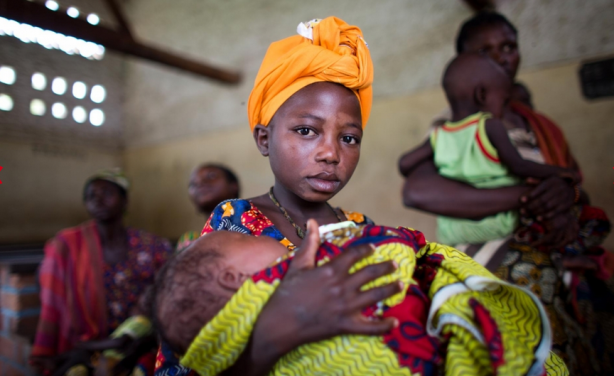The World Is A Dangerous Place For Girls
Her name is Hope. She is from a tribe in South Sudan. At age eight her family sent her to Uganda to help care for the children of a relative. At 12 she was raped – in the eyes of her family and community she is now unclean, defiled. She will no longer bring a bride price. She is now a burden on the family. She must be killed. They can’t afford to “waste” precious food on her.This is the story I was told while watching Hope play a neighborhood soccer game. A couple from the United St ates had rescued Hope and her newborn baby. At fifteen she mothered her three-year-old son, but she was also able to attend school. Being educated will give Hope a chance. As I watched this young girl, I thought of my own daughter. I was infuriated but even more so, my heart was full of sorrow. I hurt for Hope. Would she ever grasp that she is valuable? Worthy? That she is an image bearer? And what about all the other girls who are never rescued?Unfortunately Hope’s story is not unique. Over a million girls, more than those killed in the Holocaust, have been killed, aborted, or neglected simply because they are female. In countries like China and India where strong patriarchal societies exist, girls are in danger. The birth of a baby boy brings delight, celebration, honor, and potential prosperity; a baby girl brings anxiety, disappointment, shame and economic burden. It’s in these societies that girls are more apt to be aborted before birth or killed within a year of their birth (infanticide). If they live beyond a year, they are more likely to experience neglect, malnourishment, the denial of medical treatment, and limited education – the world is a dangerous place for a girl.But it’s not only dangerous “out there.” It can be dangerous right next door, here in our very own neighborhoods. For example, did you know that 1 out of 4 women in America experience domestic violence at some point in their lifetime? 1 out of 4. Although I preached in a mega church of over 3,000 people, and over half of church attenders in America today are women, I never once heard a message or illustration directed towards domestic violence. Not once. It’s not that us pastors didn’t know it existed. We knew. We counseled married couples frequently, but we never thought to talk about it from the Sunday pulpit.
ates had rescued Hope and her newborn baby. At fifteen she mothered her three-year-old son, but she was also able to attend school. Being educated will give Hope a chance. As I watched this young girl, I thought of my own daughter. I was infuriated but even more so, my heart was full of sorrow. I hurt for Hope. Would she ever grasp that she is valuable? Worthy? That she is an image bearer? And what about all the other girls who are never rescued?Unfortunately Hope’s story is not unique. Over a million girls, more than those killed in the Holocaust, have been killed, aborted, or neglected simply because they are female. In countries like China and India where strong patriarchal societies exist, girls are in danger. The birth of a baby boy brings delight, celebration, honor, and potential prosperity; a baby girl brings anxiety, disappointment, shame and economic burden. It’s in these societies that girls are more apt to be aborted before birth or killed within a year of their birth (infanticide). If they live beyond a year, they are more likely to experience neglect, malnourishment, the denial of medical treatment, and limited education – the world is a dangerous place for a girl.But it’s not only dangerous “out there.” It can be dangerous right next door, here in our very own neighborhoods. For example, did you know that 1 out of 4 women in America experience domestic violence at some point in their lifetime? 1 out of 4. Although I preached in a mega church of over 3,000 people, and over half of church attenders in America today are women, I never once heard a message or illustration directed towards domestic violence. Not once. It’s not that us pastors didn’t know it existed. We knew. We counseled married couples frequently, but we never thought to talk about it from the Sunday pulpit. Then there are also interpretations of Scriptures on marriage, submission and leadership in the home that actually create a petri dish for domestic violence. One woman shared with me how her husband had beaten and locked her in their bedroom. She went to her pastor for help. He responded, “You need to learn to submit better so your husband will rise to his potential as a spiritual leader in your home.” Another woman shared how her husband had convinced her to join him in pornography. She knew it was wrong, but she wanted to please him. It got dark, real dark, so she sought out help from their pastor. He instructed her: “be quiet, don’t tell anyone – and go home and submit to your husband.” How can we be a people who are proactive towards violence against women? How can we talk about these issues in a healthy, helpful, life-giving way? What can we do to stop the abuse? How can we make this world a safer place for girls?The Marcella Project is a 501(c)(3) nonprofit organization committed to ennobling women. To ennoble means to dignify or to lift up to nobility. The Marcella Project is transforming the way women view themselves and the way the faith community views women so that the Church can change what’s happening to women and girls around the world. Each year, The Marcella Project hosts a Gender Justice Film Festival in order to raise awareness and offer action steps in making this world a safer place for women and girls.
Then there are also interpretations of Scriptures on marriage, submission and leadership in the home that actually create a petri dish for domestic violence. One woman shared with me how her husband had beaten and locked her in their bedroom. She went to her pastor for help. He responded, “You need to learn to submit better so your husband will rise to his potential as a spiritual leader in your home.” Another woman shared how her husband had convinced her to join him in pornography. She knew it was wrong, but she wanted to please him. It got dark, real dark, so she sought out help from their pastor. He instructed her: “be quiet, don’t tell anyone – and go home and submit to your husband.” How can we be a people who are proactive towards violence against women? How can we talk about these issues in a healthy, helpful, life-giving way? What can we do to stop the abuse? How can we make this world a safer place for girls?The Marcella Project is a 501(c)(3) nonprofit organization committed to ennobling women. To ennoble means to dignify or to lift up to nobility. The Marcella Project is transforming the way women view themselves and the way the faith community views women so that the Church can change what’s happening to women and girls around the world. Each year, The Marcella Project hosts a Gender Justice Film Festival in order to raise awareness and offer action steps in making this world a safer place for women and girls. The 3rd Annual Gender Justice Film Festival will highlight two films addressing both local and global issues of gender injustice. This year, we are honored to have Evan Grae Davis, Director of award winning documentary, It's a Girl!, with us to discuss the issue of gendercide, answer questions, and offer suggestions for advocacy and affecting change.Along with It’s A Girl!, we will also be screening the documentary Power and Control. Local representatives from Genesis Women's Shelter will share about domestic violence in Dallas and equip us to take action locally.Join us at Times Ten Cellars on March 26th as we ask the question: how can we make the world a safer place for women and girls?Both films will run simultaneously in two separate rooms. The first showing begins at 7:15 and the second at 8:45, giving you two chances to see each and allowing you to join us for just one or both documentaries. Each screening will be followed by informed conversation with advocates and culture changers. There will be a short break in between to switch rooms, refill your glass, and grab a snack. Wine and food will be available for purchase.Bring a friend to save: tickets cost $30 for 1 or $50 for 2. Seating is limited. Register now to reserve yours!For more information about The Marcella Project, visit marcellaproject.com.
The 3rd Annual Gender Justice Film Festival will highlight two films addressing both local and global issues of gender injustice. This year, we are honored to have Evan Grae Davis, Director of award winning documentary, It's a Girl!, with us to discuss the issue of gendercide, answer questions, and offer suggestions for advocacy and affecting change.Along with It’s A Girl!, we will also be screening the documentary Power and Control. Local representatives from Genesis Women's Shelter will share about domestic violence in Dallas and equip us to take action locally.Join us at Times Ten Cellars on March 26th as we ask the question: how can we make the world a safer place for women and girls?Both films will run simultaneously in two separate rooms. The first showing begins at 7:15 and the second at 8:45, giving you two chances to see each and allowing you to join us for just one or both documentaries. Each screening will be followed by informed conversation with advocates and culture changers. There will be a short break in between to switch rooms, refill your glass, and grab a snack. Wine and food will be available for purchase.Bring a friend to save: tickets cost $30 for 1 or $50 for 2. Seating is limited. Register now to reserve yours!For more information about The Marcella Project, visit marcellaproject.com.

